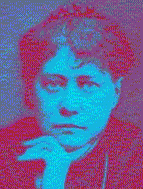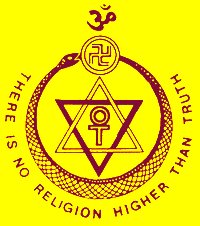The Key to Theosophy

_______________________
The Key to Theosophy
By
Duty
Q. Why, then,
the need for rebirths, since all alike fail to secure a permanent
peace?
A. Because
the final goal cannot be reached in any way but through life experiences, and
because the bulk of these consist in pain and suffering. It is only through the latter that we can learn.
Joys and pleasures teach us nothing; they are evanescent, and can only bring in
the long run satiety. Moreover, our constant failure to find any permanent
satisfaction in life which would meet the wants of our higher nature, shows us plainly that those wants can be met only on
their own plane, to wit-the spiritual.
Q. Is the
natural result of this a desire to quit life by one means or another?
A. If you
mean by such desire "suicide," then I say, most decidedly not. Such a
result can never be a "natural" one, but is ever due to a morbid
brain disease, or to most decided and strong materialistic views. It is the
worst of crimes and dire in its results. But if by desire, you mean simply
aspiration to reach spiritual existence, not a wish to quit the earth, then I would call it a very natural desire indeed. Otherwise
voluntary death would be an abandonment of our present
post and of the duties incumbent on us, as well as an attempt to shirk Karmic
responsibilities, and thus involve the creation of new Karma.
Q. But if actions on the material plane are unsatisfying, why
should duties, which are such actions, be imperative?
A. First of
all, because our philosophy teaches us that the object of doing our duties to
all men and to ourselves the last, is not the attainment of personal happiness,
but of the happiness of others; the fulfillment of right for the sake of right,
not for what it may bring us. Happiness, or rather contentment, may indeed
follow the performance of duty, but is not and must not be the motive for it.
Q. What do
you understand precisely by "duty" in Theosophy? It cannot be the
Christian
duties preached by Jesus and his Apostles, since you recognize
neither?
A. You are
once more mistaken. What you call "Christian duties" were inculcated by every great moral and religious Reformer
ages before the Christian era. All that was great, generous,
heroic, was, in days of old, not only talked about and preached from pulpits as
in our own time, but acted upon sometimes by whole nations. The history
of the Buddhist reform is full of the most noble and most heroically unselfish
acts.
Be ye all of
one mind, having compassion one of another; love as brethren, be pitiful, be
courteous; not rendering evil for evil, or railing for railing; but contrariwise,
blessing …
-was
practically carried out by the followers of Buddha, several centuries before
Peter. The Ethics of Christianity are grand, no doubt; but as undeniably they
are not new, and have originated as "Pagan" duties.
Q. And how
would you define these duties, or "duty," in general, as you understand
the term?
A. Duty is
that whichis due to Humanity, to our fellowmen,
neighbors, family, and especially that which we owe to all those who are poorer
and more helpless than we are ourselves.
This is a debt which, if left unpaid during life, leaves us spiritually
insolvent and morally bankrupt in our next incarnation. Theosophy is the
quintessence of duty.
Q. So is
Christianity when rightly understood and carried out.
A. No doubt
it is; but then, were it not a lip-religion in practice, Theosophy would have
little to do amidst Christians. Unfortunately it is but such lip-ethics. Those
who practice their duty towards all, and for duty's own sake, are few; and
fewer still are those who perform that duty, remaining content with the
satisfaction of their own secret consciousness. It is- … the public voice of
praise that honors virtue and rewards it, -which is ever uppermost in the minds
of the "world renowned" philanthropists. Modern ethics are beautiful
to read about and hear discussed; but what are words unless converted into
actions?
Finally: if
you ask me how we understand Theosophical duty practically and in view of
Karma, I may answer you that our duty is to drink without a murmur to the last
drop, whatever contents the cup of life may have in store for us, to pluck the
roses of life only for the fragrance they may shed on others, and to be
ourselves content but with the thorns, if that fragrance cannot be enjoyed without
depriving someone else of it.
Q. All this
is very vague. What do you do more than Christians do?
A. It is not
what we members of the Theosophical Society do-though some of us try our
best-but how much farther Theosophy leads to good than modern Christianity
does. I say-action, enforced action, instead of mere
intention and talk. A man may be what he likes, the most worldly,
selfish and hard-hearted of men, even a deep-dyed rascal, and it will not
prevent him from calling himself a Christian, or
others from so regarding him. But no Theosophist has the right to this name,
unless he is thoroughly imbued with the correctness of Carlyle's truism:
"The end of man is an action and not a thought,though it were the noblest"-and unless he sets
and models his daily life upon this truth. The profession of a truth is not yet
the enactment of it; and the more beautiful and grand it sounds, the more
loudly virtue or duty is talked about instead of being acted upon, the more
forcibly it will always remind one of the Dead Sea fruit. Cant is the most
loathsome of all vices; and cant is the most prominent feature of the greatest
Protestant country of this century-England.
Q. What do
you consider as due to humanity at large?
A. Full
recognition of equal rights and privileges for all, and without distinction of
race, color, social position, or birth.
Q. When would
you consider such due not given?
A. When there
is the slightest invasion of another's right-be that other a man or a nation;
when there is any failure to show him the same justice, kindness, consideration,
or mercy which we desire for ourselves. The whole present system of politics is
built on the oblivion of such rights, and the most fierce
assertion of national selfishness. The French say: "Like master, like
man." They ought to add, "Like national policy, like citizen."
Q. Do you
take any part in politics?
A. As a Society, we carefully avoid them, for the reasons given
below. To seek to achieve political reforms before we have effected
a reform in human nature, is like putting new wine into old bottles. Make men
feel and recognize in their innermost hearts what is their real, true duty to
all men, and every old abuse of power, every iniquitous law in the national
policy, based on human, social, or political selfishness, will disappear of
itself. Foolish is the gardener who seeks to weed his flowerbed of poisonous
plants by cutting them off from the surface of the soil, instead of tearing
them out by the roots. No lasting political reform can be ever achieved with
the same selfish men at the head of affairs as of old.
__________________________

Find answers to more questions
with
these Theosophy links
Dave’s
Streetwise Theosophy Boards
The Theosophy Website that
Welcomes Absolute Beginners
If you run a Theosophy Study Group,
please feel free
to make use of the
material on this Website
The Most Basic Theosophy
Website in the Universe
A quick overview of Theosophy
and the Theosophical Society
If you run a Theosophy Study Group you
can use this as an introductory handout.

Cardiff Theosophical Society meetings
are informal
and there’s always a cup of tea afterwards
The
Cardiff Theosophical Society Website
The
National Wales Theosophy Website
This is for
everybody not just people in Wales
Theosophy Cardiff’s Instant Guide
General pages
about Wales, Welsh History
and The History of
Theosophy in Wales
Independent Theosophy Blog
One liners and quick explanations
About aspects of Theosophy
H P Blavatsky is usually the only
Theosophist that most people have
ever
heard of. Let’s put
that right
Lentil burgers, a
thousand press ups before breakfast and
the daily 25 mile
run may put it off for a while but death
seems to get most of
us in the end. We are pleased to
present for your
consideration, a definitive work on the
subject by a Student of
Katherine Tingley entitled
An
Independent Theosophical Republic
Links to Free Online Theosophy
Study Resources; Courses, Writings,
No
Aardvarks were harmed in the
The Spiritual Home of Urban Theosophy
The Earth Base for Evolutionary Theosophy
Classic Introductory
Theosophy Text
A Text Book of Theosophy By C
What Theosophy Is From the Absolute to Man
The Formation of a Solar System The Evolution of Life
The Constitution of Man After Death Reincarnation
The Purpose of Life The Planetary Chains
The Result of Theosophical Study
An Outstanding
Introduction to Theosophy
By a student of
Katherine Tingley
Elementary Theosophy Who is the Man? Body and Soul
Body, Soul and Spirit Reincarnation Karma
Preface
Theosophy and the Masters General Principles
The Earth Chain Body and Astral Body Kama – Desire
Manas Of
Reincarnation Reincarnation Continued
Karma Kama Loka
Devachan
Cycles
Arguments Supporting Reincarnation
Differentiation Of Species Missing Links
Psychic Laws, Forces, and Phenomena
Psychic Phenomena and Spiritualism
Quick Explanations with Links to More
Detailed Info
What is Theosophy ? Theosophy Defined (More Detail)
Three Fundamental Propositions Key Concepts of Theosophy
Cosmogenesis
Anthropogenesis
Root Races
Karma
Ascended Masters After Death States
Reincarnation
The Seven Principles of Man Helena Petrovna Blavatsky
Colonel Henry Steel Olcott William Quan Judge
The Start of the Theosophical Society Theosophical Society Presidents
History of the Theosophical Society Glossaries of Theosophical Terms
History of the Theosophical Society in Wales
The Three Objectives of the Theosophical Society
Explanation of the Theosophical Society Emblem
Karma Fundamental Principles Laws: Natural and Man-Made The Law of Laws
The Eternal Now
Succession
Causation The Laws of Nature A Lesson of The Law
Karma Does Not Crush Apply This Law
Man in The Three Worlds Understand The Truth
Man and His Surroundings The Three Fates The Pair of Triplets Thought, The Builder
Practical Meditation Will and Desire
The Mastery of Desire Two Other Points
The Third Thread Perfect Justice
Our Environment
Our Kith and Kin Our Nation
The Light for a Good Man Knowledge of Law The Opposing Schools
The More Modern View Self-Examination Out of the Past
Old Friendships
We Grow By Giving Collective Karma Family Karma
National Karma
India’s Karma
National Disasters
Try these if you are looking
for a
local Theosophy Group or Centre
UK Listing of Theosophical Groups